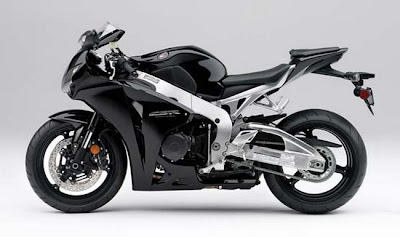Stop That! - The Honda CBR1000RR (along with the CBR600RR) are breaking new ground by offering one of the most innovative braking systems ever: Honda’s revolutionary Combined ABS.
Combined Anti-Lock Braking (C-ABS) - All-new, electronically controlled Combined ABS distributes brake force over both wheels, helping to maintain braking confidence in less than ideal conditions. Electronic measurement of rider input on each brake lever permits application of only the front or rear brake in some cases, while the system combines both brakes in others.
Unit Pro-Link Suspension - By eliminating the frame-mounted top shock mount, Unit Pro-Link isolates the chassis from bumps, resulting in more precise handling and better traction. Developed on Honda's championship-winning MotoGP bikes, it's a perfect example of the CBR's superior engineering.
MotoGP-Style Exhaust - The CBR1000RR's lowboy muffler not only looks cool and sounds great, it also offers a handling advantage by moving the silencer lower and closer to the bike's center of mass. GP bikes do that to make the machines more responsive, and you get the same benefit with the CBR1000RR.
Slipper Clutch - The CBR1000RR uses a patented slipper-clutch design with a special cam-assist mechanism for easier actuation. That means you get a light feel at the lever, the feedback a cable system provides, and all the backtorque-limiting benefits a slipper clutch provides.
Twin-Spar Aluminum Chassis - By varying the wall thickness of the chassis' main elements, our engineers can fine-tune chassis rigidity precisely, and in individual areas. You get a frame that offers the perfect balance of a stable riding platform but with no harshness.
Dual-Stage Fuel Injection - Two injectors per cylinder – one primary and one secondary – controlled by an ECU that senses RPM and throttle opening, ensure both low- and high-rpm performance. You get near instantaneous high-rpm response, along with great low-rpm metering and clean running.
Centrally Located Fuel Tank - Centrally located fuel tank increases mass centralization for a more compact frame design.
Idle Air Control Valve - Idle air control valve
minimizes torque reaction and smoothes response to small throttle changes through gradual reductions of air and fuel intake when throttle is opened and closed.
Two-Stage Ram Air - Nose mounted, two-stage ram air system provides a high volume of cool air to the airbox, for linear power delivery and superb engine performance.
Honda Multi-Action System (HMAS) Inverted Fork - The HMAS cartridge fork features an exclusive internal piston construction. This innovative design employs smaller-diameter pistons to keep oil velocity high for improved damping characteristics and an expanded range of adjustability. The result: you get more precise suspension performance, especially over smaller surface irregularities.
Radial Front-Brake Calipers - The CBR1000RR's radial-mounted monoblock front-brake calipers are stiffer, for better brake feel and performance. Each caliper uses four chromium-plated aluminum pistons that squeeze lightweight 320mm floating discs for exceptional stopping power.
Honda Electronic Steering Damper
Power is one thing, but the key to a great sportbike is how it handles, and that’s where the Honda Electronic Steering Damper (HESD) comes in. Compact, unobtrusive and super-smart, it helps maintain smoothly predictable high-speed handling and low-speed maneuverability.
Follow The Leaders
Honda has always used racing to improve our sportbikes, and the CBR1000RR is a great example. A major force in the World Superbike Championship, you can follow Honda’s performance and catch up on Team Honda's highlights on our racing pages.
Honda Genuine Accessories
Color-Matched Passenger Seat Cowl
CBR® Racing Cycle Cover (for indoor use)
Carbon-Fiber Accents
Carbon Fiber License Plate Frame
Outdoor Cycle Cover
"E-Cushion" Seat for greater comfort
Rear Tire Hugger
HRC Power-Up Kit for Racing (Track Use Only)
2011 Honda CBR1000RR - United States of America Specifications
USA MSRP - $TBA USD
Model: CBR1000RR / CBR1000RR C-ABS
Engine Type: 999cc liquid-cooled inline four-cylinder
Bore and Stroke: 76mm x 55.1mm
Compression ratio: 12.3:1
Valve Train: DOHC; four valves per cylinder
Induction: Dual Stage Fuel Injection (DSFI)
Ignition: Computer-controlled digital transistorized with 3-D mapping
Transmission: Close-ratio six-speed
Final Drive: #530 O-ring-sealed chain
Suspension
Front: 43mm inverted HMAS cartridge fork with spring preload, rebound and compression damping adjustability; 4.3 inches travel
Rear: Unit Pro-Link HMAS single shock with spring preload, rebound and compression damping adjustability; 5.4 inches travel
Brakes
Front: Dual radial-mounted four-piston calipers with full-floating 320mm discs
Rear: Single 220mm disc;
Optional Honda Electronic Combined ABS
Tires
Front: 120/70ZR-17 radial
Rear: 190/50ZR-17 radial
Wheelbase: 55.4 inches
Rake (Caster Angle): 23.3°
Trail: 96.2mm (3.8 inches)
Seat Height: 32.3 inches
Fuel Capacity: 4.7 gallons, including 1.06-gallon reserve
Estimated Fuel Economy: 37 mpg
Colors Options:
CBR1000RR: Repsol Edition
CBR1000RR C-ABS Black
CBR1000RR C-ABS: Red/Black
Curb Weight*: 439 pounds (CBR1000RR) / 462 pounds (CBR1000RR C-ABS)
*Includes all standard equipment, required fluids and full tank of fuel-ready to ride.
Honda's fuel-economy estimates are based on EPA exhaust emission measurement test procedures and are intended for comparison purposes only. Your actual mileage will vary depending on how you ride; how you maintain your vehicle; weather; road conditions; tire pressure; installation of accessories; cargo, rider and passenger weight; and other factors.
Meets current EPA standards.
Models sold in California meet current CARB standards and may differ slightly due to emissions equipment.













0 Comments :
Post a Comment